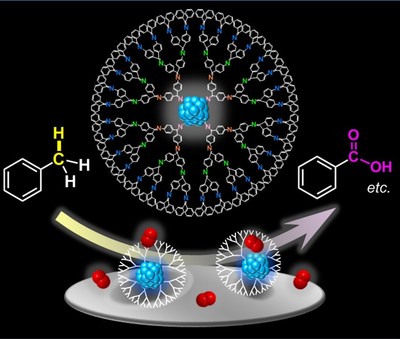Metallic nano-particles light up another path towards eco-friendly catalysts

---Platinum clusters consisting 19 atoms perform 50 times higher catalytic activity---
TOKYO, Nov. 16, 2018 /PRNewswire/ -- Scientists at Tokyo Institute of Technology produced subnano-sized metallic particles that are very effective as catalysts for the oxidation of hydrocarbons. These catalysts can be as much as 50 times more effective than well-known Au-Pd bimetallic nanocatalysts.

Catalytic activity of subnano-sized metallic particles within dendrimers: Each dendrimer molecule hosts a subnano-sized metallic particle that allows for the oxidation of aromatic hydrocarbons, such as toluene (left), to produce useful organic compounds, such as benzoic acid (right). Oxygen molecules are represented in red.
The oxidation of aromatic hydrocarbons is critically important for producing a great variety of useful organic compounds that are used throughout all types of industries. These oxidation processes require the use of catalysts and solvents, which are usually environmentally hazardous. Thus, finding a solvent-free oxidation process using nanosized catalytic particles has attracted considerable attention. Interestingly, sub-nanoscale catalytic particles (subnanocatalysts, or SNCs) composed of noble metals are even better at their job because their increased surface area and unique electronic state results in favorable effects for oxidizing hydrocarbons and also prevents them from getting oxidized themselves. This makes them cost-effective because the amount of metal required for SNCs is lower than for nano-sized catalysts.
A team including Dr. Miftakhul Huda, Keigo Minamisawa, Dr. Takamasa Tsukamoto, and Dr. Makoto Tanabe at Tokyo Institute of Technology (Tokyo Tech), led by Prof. Kimihisa Yamamoto, created multiple types of SNCs by using dendrimers, which are tree-like spherical molecules that can be used as a template to contain the desired catalysts. "Dendrimer is expected to provide internal nanospaces that could be suitable for catalytic conversion in the presence of metal particles," explains Yamamoto.
The team created various catalysts of different sizes, depending on the noble metal used and the number of atoms of each catalytic particle. They compared their performance to find the best noble metal for making SNCs and then tried to determine the mechanism behind their high catalytic activity. Smaller SNCs were found to be better, while less oxophilic metals (such as platinum) were superior. The team postulated that the surface of platinum SNCs does not oxidize easily, which makes them reusable and results in the highest catalytic performance of the Pt19 SNC that can be as high as 50 times more effective than the common Au-Pd nanocatalysts. The team will continue working to shed light on these catalytic phenomena. "The development of a more detailed mechanism including theoretical considerations is currently in progress," says Tanabe. The applications of such catalysts could greatly contribute for reducing pollution and enhancing our effective use of Earth's metal resources.
Related links
How a tetrahedral substance can be more symmetrical than a spherical atom
A Preparative-Scale Reaction Using Platinum Clusters with a Single-Digit Atomicity Realized
One-Nanometer Trimetallic Alloy Particles Created
Reference
Authors:
|
Miftakhul Huda1,2, Keigo Minamisawa1, Takamasa Tsukamoto1,2, Makoto Tanabe*1,2, |
Title of original paper:
|
Aerobic Toluene Oxidation Catalyzed by Subnano Metal Particles (Selected as a Very Important Paper (VIP) –less than TOP 5%–) |
Journal: |
Angewandte Chemie International Edition |
DOI: |
10.1002/anie.201809530 |
Affiliations:
|
1Institute of Innovative Research, Tokyo Institute of Technology 2JST–ERATO, Yamamoto Atom Hybrid Project, Tokyo Institute of Technology |
*Corresponding author's email: yamamoto@res.titech.ac.jp
About Tokyo Institute of Technology
Tokyo Tech stands at the forefront of research and higher education as the leading university for science and technology in Japan. Tokyo Tech researchers excel in fields ranging from materials science to biology, computer science, and physics. Founded in 1881, Tokyo Tech hosts over 10,000 undergraduate and graduate students per year, who develop into scientific leaders and some of the most sought-after engineers in industry. Embodying the Japanese philosophy of "monotsukuri," meaning "technical ingenuity and innovation," the Tokyo Tech community strives to contribute to society through high-impact research. www.titech.ac.jp/english/
![]() View original content to download multimedia:https://www.prnewswire.com/news-releases/metallic-nano-particles-light-up-another-path-towards-eco-friendly-catalysts-300751232.html
View original content to download multimedia:https://www.prnewswire.com/news-releases/metallic-nano-particles-light-up-another-path-towards-eco-friendly-catalysts-300751232.html